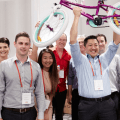Workplace culture, encompassing the values, beliefs, and behaviours within a business, has evolved dramatically over the years. When we launched Corporate Challenge Events in 1994, no one could have foreseen the remarkable changes in team culture that would unfold over the next 30 years. It has been a remarkable journey, reflecting broader societal shifts and technological advancements.
From the rigid, hierarchical structures of yesteryears to today’s dynamic and inclusive environments, the evolution of workplace culture tells a compelling story about our changing world. We are excited to share our experiences and insights, highlighting the most significant shifts in workplace culture we’ve observed in the team-building industry over the past 30 years.

Pre 1994:
To truly appreciate the evolution of workplace culture, we first need to visit what happened in the lead-up to the 1990s.
The origins of corporate workplace culture can be traced back to the Industrial Revolution, a period marked by significant economic and technological advancements. During this time, businesses adopted hierarchical structures similar to military organisations, with a clear chain of command and strict division of labour. This approach aimed to maximise efficiency and productivity but often overlooked employee well-being.
In the early 20th century, the rise of large corporations further entrenched these hierarchical models. Workplaces were characterised by rigid structures, authoritative leadership styles, and a focus on standardised processes. Employees were often viewed as interchangeable parts of a machine, expected to follow orders without question. This period also saw the establishment of corporate office environments, where formality and adherence to protocol were paramount.
Despite these rigid structures, some early movements began to recognise the importance of employee welfare. The Human Relations Movement, emerging in the 1930s and 1940s, introduced the idea that employee satisfaction and productivity were linked. However, it wasn’t until later decades that more substantial changes began to take root.
By the 1980s, companies started to explore more flexible and inclusive approaches, influenced by Japanese management practices that emphasised teamwork and employee involvement. Yet, the predominant culture remained hierarchical and top-down, setting the stage for the significant transformations that would follow in the subsequent decades.
1994 - 2024

Technology
The period from 1994 to 2024 has been defined by rapid technological advancements that have fundamentally transformed workplace culture. The advent of personal computers, the internet, and mobile technologies revolutionised how businesses operate and how employees interact.
When we launched Corporate Challenge Events in 1994, all files were handled in manila folders, proposals were sent as word documents, and phone calls were our main source of inquiry. The widespread adoption of personal computers and the internet soon began to reshape these traditional methods. Email became a primary mode of communication, increasing the speed and efficiency of information exchange.
The early 2000s saw the rise of mobile technology and the introduction of smartphones, which further blurred the lines between work and personal life. Employees gained the ability to stay connected and work remotely, leading to the emergence of telecommuting. This shift was accelerated by cloud computing, which allowed access to work materials from anywhere, fostering greater flexibility and collaboration.
Technological tools like instant messaging, video conferencing, and project management software have become integral to modern workplaces. Platforms such as Slack, Zoom, and Asana have improved communication and collaboration, enabling more agile and responsive business operations.
At Corporate Challenge Events, we’ve leveraged technology to modernise team building. Our innovative initiatives, such as the AppVenture program, have seamlessly integrated custom software with exhilarating scavenger hunts, elevating team-building experiences to new heights. By embracing digital platforms to all of our programs and phasing out paper-based processes, we’ve been able to integrate technology to redefine collaboration and engagement.
Studies show that technological advancements have had a mixed impact on productivity and employee well-being. On one hand, technology has facilitated faster decision-making and increased access to information. On the other hand, it has led to concerns about work-life balance and potential burnout, as employees are often expected to be available around the clock.

Employee Engagement and Well-being
The past 30 years has seen a shift from viewing employees as mere resources to recognising them as valuable assets whose satisfaction and well-being directly impact organisational success.
In the 1990s, workplaces were often characterised by hierarchical structures and top-down management styles. Over the past three decades, however, there has been a move toward flattened hierarchies, where employees at all levels are encouraged to contribute ideas and participate in decision-making processes. This shift has fostered a more inclusive and collaborative environment.
At Corporate Challenge Events, we have seen this transformation firsthand. Our programs, once focused solely on playing games, have evolved with a focus on developing human skills, fostering stronger relationships, and boosting employee engagement. Companies increasingly seek to create positive and engaging experiences for their employees, understanding that a motivated workforce leads to better performance and lower turnover rates.
Leadership styles have also evolved. The authoritarian approach that once dominated has given way to more empathetic and supportive leadership. Modern leaders are expected to be mentors and coaches, focusing on personal development and fostering a positive work environment. This change is supported by numerous studies showing that employee recognition and supportive leadership significantly enhance job satisfaction and productivity. We have seen a significant rise in leadership participation in our programs over the years, with the introduction of progressive leaders passionate about people-first cultures.
There is also less scepticism about the importance of employee engagement. In the past, initiatives aimed at improving workplace culture were often viewed with suspicion, seen as superficial or unnecessary. Today, there is a greater understanding of the tangible benefits these initiatives bring. Research consistently shows that engaged employees are more productive, more innovative, and more committed to their organisations.
Team-building activities, once viewed as mere recreational events, are now recognised as powerful tools for fostering collaboration, communication, and trust among team members. Research has shown that effective team building improves team cohesion, morale, and productivity. Companies are investing more in team-building initiatives, recognising their role in building strong, cohesive teams that drive organisational success.
The COVID-19 pandemic underscored the importance of employee well-being, prompting companies to invest more in mental health resources, virtual team-building activities, and wellness programs. This focus on holistic well-being is likely to continue as organisations strive to create supportive and resilient workplace cultures.

Corporate Social Responsibility (CSR)
Corporate Social Responsibility (CSR) has undergone a remarkable evolution from its emerging stages in the early 20th century to becoming a central element of strategic importance for businesses globally in 2024. This comprehensive evolution reflects not only the changing landscape of global business practices but also the shifting expectations of both consumers and employees towards businesses’ social, environmental, and ethical responsibilities.
In the late 20th century, CSR was often seen as a peripheral concern, with companies primarily focused on maximising profits and shareholder value. However, as public awareness of social and environmental issues grew, so too did expectations for businesses to act responsibly and ethically.
In the workplace, employee expectations around CSR transformed dramatically. A notable study by Cone Communications in 2016 found that 64% of millennials weigh a company’s social and environmental commitments heavily when choosing their employment, highlighting a shift towards workplaces that champion sustainability, diversity, and social responsibility.
On the consumer front, demand surged for businesses that operate responsibly. A Nielsen report in 2020 showed that 73% of global consumers would modify their habits to lessen environmental impact, with certifications like Fair Trade and B Corp guiding consumers towards brands that reflect their values.
At Corporate Challenge Events, we recognised this demand and in 2007, we introduced our first charity team-building program, Bikes for Tykes, which aimed to provide bicycles to underprivileged children. This initiative not only aligned with our values but also allowed us to make a tangible positive impact on the community. It marked the beginning of our journey toward integrating CSR into our core vision. In 2010 we added “Our actions affect our community” to our list of core beliefs.
CSR has developed a profound relationship with workplace culture, infusing it with a sense of purpose and responsibility that extends beyond traditional business objectives. This synergy between CSR and workplace culture is more than just a coincidental alignment; it represents a fundamental shift in how businesses operate and interact with their stakeholders. A positive and vibrant workplace culture, driven by robust CSR principles, attracts talent, fosters innovation, and builds a loyal customer base by demonstrating a commitment to ethical practices and social values.
%
of millennials weigh a company’s social and environmental commitments heavily when choosing their employment

Flexible Work Arrangements and Work-Life Balance
Over the past few decades, there has been a notable shift in attitudes towards work-life balance and the traditional 9-to-5 office culture. This shift has been driven by various factors, including technological advancements, changing demographics, evolving employee expectations and of course COVID-19.
In recent years, there has been a growing recognition that employees have responsibilities and interests outside of work, and that accommodating these can lead to happier, more productive workers. As a result, many organisations, including Corporate Challenge Events, have adopted flexible work arrangements such as remote work, flexitime, and compressed workweeks.
At Corporate Challenge Events, this era marked the introduction of our virtual and hybrid team building models. These new formats have allowed us to continue fostering positive team cultures and collaboration, even when physical gatherings were not possible.
However, flexible work arrangements also present challenges, such as maintaining team cohesion and communication, ensuring equitable access to opportunities for all employees, and addressing issues of burnout and overwork. It’s a hot topic still out for debate.
As we venture into the second half of 2024, the debate around return-to-office (RTO) policies has intensified. There seems to be a growing divergence between employers advocating for in-office attendance and employees seeking the flexibility offered by remote work.
According to a Resume Builder report, an overwhelming 90% of companies plan to implement RTO policies by the end of 2024. The message from most companies, according to recent surveys, is that even if five days a week won’t be a requirement, office attendance will be more closely tracked in 2024. The definition of RTO is changing, with mandates increasingly not applying to every employee, every day.
At the same time, the “return to office or else” approach adopted by some CEOs has had limited success. In a recent survey a shift in perspective has emerged revealing that only 4% of CEOs worldwide say they will prioritise bringing workers back to the office full time with recruitment and retention emerging as higher priorities. This suggests that while there’s a push towards RTO, the emphasis on physical presence in the office isn’t universal among company leaders.
Meanwhile, employees’ perspectives on RTO are varied. Many employees appreciate the social interaction and collaboration opportunities that come with working in an office. However, others value the flexibility, autonomy, and work-life balance that comes from remote work.
It’s clear that mastering hybrid work will require a balanced approach, taking into consideration the needs and preferences of both employers and employees. The challenge lies in creating a work model that combines the best of both worlds, offering the flexibility of remote work without compromising the benefits of an office environment.
Learning and Development
The evolution of workplace culture over the past three decades has been deeply intertwined with advancements in learning and development practices. From the traditional classroom-style training of the past to the innovative, technology-driven approaches of the present, the way organisations invest in their employees’ growth and skill development has undergone significant transformation.
In the early years, learning and development initiatives were often limited to formal training sessions conducted in physical classrooms or conference rooms. These sessions typically focused on job-specific skills and were delivered in a one-size-fits-all format. While valuable, this approach lacked flexibility and customisation to meet the diverse needs of employees.
However, as technology began to flood every aspect of business operations, the landscape of learning and development underwent a profound shift. The rise of e-learning platforms, webinars, and virtual classrooms revolutionised the way training programs were delivered, making learning more accessible, interactive, and personalised.
In 2012, we launched our own team building workshop department aimed at boosting positive team cultures. This initiative was driven by our commitment to helping organisations foster stronger, more engaged teams through targeted learning interventions. By investing in learning initiatives that align with their strategic objectives and core values, companies can cultivate a workforce that is adaptable, resilient, and equipped to tackle the challenges of today’s rapidly changing business environment.
The impact of learning and development on workplace culture cannot be overstated. Organisations that prioritise employee development create a culture of continuous learning and growth, where employees feel valued, supported, and empowered to reach their full potential.
As we reflect on the journey of workplace culture, one thing becomes clear: change is constant. Embracing this reality, we must actively shape cultures that empower, inspire, and adapt. If you’re interested in enhancing your team culture, we’re here to help.





Recent Comments